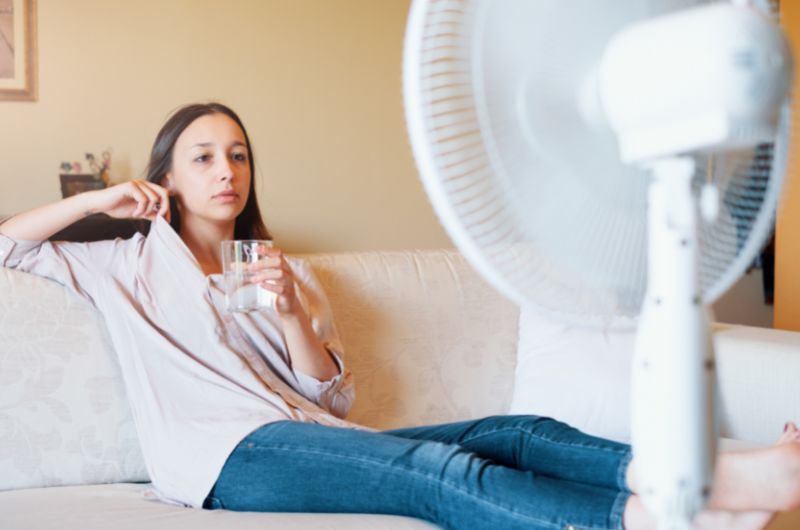While sweating may be a normal body occurrence, sometimes it happens in excess/Hyperhidrosis. Excessive sweating might be due to a genetic disorder or an underlying health condition. If it happens due to heredity and no health-related triggers, it’s primary Hyperhidrosis. Sometimes stress and anxiety may trigger this condition. Secondary Hyperhidrosis occurs due to an underlying health condition. The triggers for secondary Hyperhidrosis include diabetes, pregnancy, hyperthyroidism, anxiety, menopause, or medication.
Did you know that you sweat to maintain normal body temperature? As the sweat evaporates from your skin, the body temperature lowers and adjusts to normal body functioning temperature. However, too high or too low body temperature proves dangerous to the body.
So, if you experience intense sweating on your head to make your hair wet, you could have Hyperhidrosis. However, before diagnosing Hyperhidrosis, you need to check on other dietary and behavioral factors that contribute to excessive sweating.
If you sweat after excising, then that will be a normal occurrence. However, if you are sweating even when resting, you need to visit a doctor and get checked.
What triggers too much sweating to make your hair wet?
1. Primary Focal Hyperhidrosis
Hyperhidrosis refers to a condition commonly called excessive sweating. If the sweating occurs without an underlying health condition, it causes primary Hyperhidrosis.

Focal means on the forehead, underarms, palms, or feet. Although it makes people uncomfortable, focal Hyperhidrosis doesn’t result from nervousness or severe illness.
Scientists have not succeeded in finding the cause of excessive sweating. The glands function as those in normal-sweating people.
Scientists believe it to be a genetic disorder where the sweat glands produce excess sweat even when not needed. Conditions like stress and anxiety serve as triggers for this condition.
Medication helps paralyze the sweat glands or lead to their normal functioning. Botox injections and surgery also prove helpful to counter the glands that secret this excessive sweat.
If you find excessive sweating making your hair wet affects other parts, don’t get embarrassed. Instead, look for help by visiting your doctor for a proper diagnosis.
2. Secondary Hyperhidrosis
Secondary Hyperhidrosis means that the excessive sweating you might be experiencing arises from an underlying health condition.
The sweating in secondary Hyperhidrosis occurs all over the body or in one specific area, unlike in the forearms, feet, or head as in primary Hyperhidrosis.
The sweating will also tend to happen more at night than during the day. Some underlying conditions that cause secondary Hyperhidrosis include:
Pregnancy
Are you pregnant? If not sure, you need to go and get a pregnancy test. The hormonal changes, higher metabolism, and increased blood flow to the uterus during pregnancy could cause excessive sweating.
You might be pregnant if you notice an excess sweating phenomenon that wasn’t there before.
If it turns out to be the case, you do not need to worry. However, you will need to drink lots of water to keep hydrated.
Thyroid problem

Most thyroid issues present themselves through excessive sweating. It mostly occurs in pregnant women since the hormonal changes may trigger excessive sweat production.
In addition, the hormonal spike sends the thyroid gland to overproduction of thyroid hormones.
The body assumes a very active state hence excessive sweating. If this happens to your face and head, you will automatically sweat, making your hair wet.
Other symptoms that signify hyperthyroidism include:
- Jitteriness
- Rapid loss of weight
- Fatigue
- Tremors
- Fast heart rate
- Goiter/enlarged thyroid
You should see your doctor since these symptoms require immediate medical attention.
Diabetes
If you have diabetes, then excessive sweating may signify three things:
- Your blood sugar level has dropped. When the blood sugar level drops to dangerously low levels, you might experience these sweating episodes. You will need to act quickly to restore it to normal levels.
- Food triggers. Commonly referred to as gustatory sweating, this condition occurs when a severely diabetic patient gets around food. The sweating gets confined around the head and neck. It may be a major reason you sweat so much your hair gets wet.
- Nocturnal Hyperhidrosis. Night sweats in diabetic patients may occur to signify an underlying condition. These conditions might be infections, sleep apnea, or hormonal imbalance. Low blood sugar might also trigger nocturnal sweating.
If you have diabetes, you should watch these three types of sweating. Once you correct the cause, they tend to disappear.
Menopause
During perimenopause, the period just before menopause, you might experience excessive sweating.

The sweating happens as the body tries to adjust to the varying hormonal imbalance caused by menopause. As a result, you will experience fever symptoms with sweaty underarms and recurring nocturnal Hyperhidrosis.
The hot flashes/fever happens due to shifts in estrogen levels. The fever may get to the point of causing flushed skin.
If you might be experiencing this perimenopause sweating, you should check with your doctor if the symptoms get worse.
Some over-the-counter medication might help treat the symptoms. However, as menopause sets in, the hormones stabilize, and you return to your normal self.
Anxiety
If you get anxious, the body may respond by producing excessive sweat. The sweat may be too much, making your hair wet. The stress hormones increase in response to counter the attack causing anxiety.
This cause the skin to lose excess water that would have gotten lost through the kidney. This automatic response serves to prevent urination amid self-defense.
If you get anxiety attacks without exposure to danger, you need to see your doctor for proper anxiety treatment.
Medication
Diaphoretic drugs cause excessive sweating in some people. If the sweating starts upon drug prescription, it could have triggered the excessive sweating.
Some medications that may cause sweating episodes include:
- Cardiovascular drugs
- Hormonal treatments
- Chemotherapy
- Painkillers
- Blood sugar medication
- Some antibiotics
The sweating tends to go away after the medication is over. Therefore, you should not panic if this happens.
FAQs
Why does my head sweat so much my hair is wet?
You could have Hyperhidrosis.
When should I be concerned about constant night sweats?
Suppose the sweating goes on for over two weeks with accompanying symptoms like fever, weight loss, and body aches. It could signify the onset of diabetes or other health conditions.
Can excessive head sweats cause hair loss?
Yes, because it clogs hair follicles preventing hair growth
Conclusion
If you experience excessive sweating without an underlying health condition, the doctors have a solution to help prevent this from happening.
If it’s due to an underlying health-related condition, treating the cause helps restore normalcy. Seeing a doctor is the only safe option if you notice excessive sweating.


